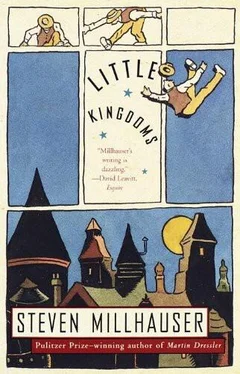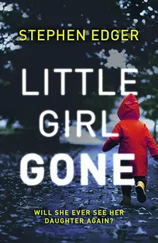Kroll sat in his gloomy office behind a cluttered desk with a small neat space in the center, under a yellow bulb that hung from a chain. He was a big broad-shouldered man with a heavy fleshy face and melancholy eyes. His sparse black hair was combed sideways across the top of his head and seemed to match the dark hairs on his fingers, which looked as if they had been combed carefully sideways. Franklin had never seen Kroll except behind his desk, and he wondered, as he sat down on a wheezing leather chair, whether Kroll ended in a straight line where the desk cut him off.
For all Kroll’s air of heaviness, of rueful immobility, Franklin knew he was not a man to waste time. Kroll began by saying that he had waited to see the cartoon himself before speaking with Mr. Payne, who might for that matter have informed him of a project that was bound to be of interest to the World Citizen. The little film was admirable — he had expected no less from a man of Mr. Payne’s undoubted abilities — and well deserved the attention it had been getting. But he hadn’t called Mr. Payne to his office in order to discuss the craft of animated drawings, despite the interest such a discussion would hold for him; for as a matter of fact, he had been following the work of the animation studios for some time. No, what he wished to discuss with Mr. Payne was the subject of his little film. He had to confess that he had become — what was the word? — thoughtful, very thoughtful, upon hearing that a member of the art department had chosen to animate a strip no longer published in the World Citizen but still published in the Cincinnati Daily Crier and imitated in a number of New York papers. He had assumed that the report must have been mistaken; but now that he had seen the cartoon himself there could no longer be room for doubt. During the time of his association with the World Citizen , Mr. Payne had shown himself to be a loyal member of the staff. It was therefore difficult to understand his motives for engaging in an enterprise that could serve only to benefit the circulation of rival papers. He did not at this time wish to discuss the issue of motives; he wished simply to inform Mr. Payne that he was to cease at once all professional activities not calculated to advance the interests of the World Citizen , that he was to keep the editorial office apprised of all future projects relating to the animation of comic strips, and that, in order to take advantage of the attention aroused by his film, he was immediately to revive his old strip, under the new title “Dime Museum Days.” He trusted there would be no misunderstandings in the future, and wished Mr. Payne a good day.
As Franklin coolly reported the interview to Max, he realized that what had most upset him about it had been Kroll’s crass assumption that he had animated his old strip. Of course he had drawn on “Dime Museum Dreams,” but there had been no attempt to drag his old strip out of the attic, brush off the cobwebs, and present it to the public all over again. Rather he had sunk into a familiar place in his mind and emerged with something entirely new, something mysteriously connected with his father’s grave voice in the kitchen darkroom. At the same time Max’s savage attack on Kroll, who he said had the look of a debauched Humpty-Dumpty, struck Franklin as wide of the mark, for he recognized with a kind of irritation that he did not entirely disagree with Kroll’s position. Kroll was by no means the corrupt buffoon Max made him out to be; his alertness to possible injuries to the World Citizen was surely proper. Franklin hadn’t given a moment’s thought to the possible consequences of his animated cartoon, his kingdom of shadows, and his carelessness seemed to him blameworthy. His next cartoon would give Kroll no grounds for concern, since it would have nothing whatever to do with any of his strips. Meanwhile he intensely disliked the idea of reviving the old strip, which no longer interested him; but he supposed he could stand it for a few months.
Perhaps it was the talk with Kroll, perhaps it was the sense of having completed a long and arduous task, in any case Franklin felt tired — very tired — tired deep in his bones. In the mornings when he heard the rattle of milk bottles in the wire box on the front porch he lay in a heavy stupor of half waking, thinking how nice it would be to lie there a little longer, only a little longer; and the heaviness, the sense of being bound to his bed, made him think of his child’s illustrated Gulliver’s Travels , in which Gulliver was shown lying on his back with disturbingly thick, taut bolts of hair tied to little stakes in the ground. In the graying light of late afternoons, on the commuter train that made its way along the river toward the Victorian station one township south of Mount Hebron, Franklin sat back with half-closed eyes and listened to the soft squeak of the conductor’s shoes, the soothing click-click of the ticket punch; and in the lamplit evenings, sitting in the soft armchair in the parlor, he listened to Cora practice her Czerny exercises while Stella bent frowningly over sheets of paper at her round worktable or played on the rug with her little wooden wash set: her washtub, her clothes wringer, her clotheshorse, her washboard. Sometimes he read aloud to Stella while she sat in his lap with her hair tickling his cheek. He read The Young Folks’ Story Book, Shining Hours, Grimm’s Household Fairy Tales , and a boxed set of four small books called Polly’s Jewel Case , which included Fireside Fancies, Very Pretty, Dear Little Buttercup , and Miss Mugglewump and the Thugglebump (“Just kidding, Stel”). Later, when Stella had been put to bed, he would sit at the kitchen table with Cora and play one of the board games she sometimes enjoyed, like Innocence Abroad, or Steeplechase, or The Game of Life. Then he would retire to his armchair, where he would sit heavy-lidded and heavy-limbed, weary but not sleepy, while Cora sat reading on the couch. Sometimes he thought of his tower study, which seemed as remote and inaccessible as a tower in a fairy tale: to reach it he would have to climb innumerable flights of stairs, only to find, behind a moldering door, in an old room so thick with cobwebs that he would have to part them like layers of gauze, an old clock with a rusted key, a pile of yellowed pages, a cracked bottle of dried ink.
On a Saturday house visit to Stella, who lay in bed with a sore throat, Dr. Shawcross lingered to examine Franklin. In a grave voice that reminded Franklin of his father in the darkroom, Dr. Shawcross said that he was suffering from nervous exhaustion as a result of overwork. He recommended rest, a curtailed work schedule, and as much time as possible in the fresh country air. Franklin, struck by the kindness in the doctor’s voice, thought how odd it was that this kind man, the very opposite of a Kroll, nevertheless reminded him somehow of the harsh editor, and later that night, as he lay in the dark staring up at the black ceiling that was the floor of his forbidden study, he suddenly made the connection: both Kroll and Shawcross had issued warnings, and both had exacted from him promises of obedience — as if they had secretly conspired, though for different reasons, to punish him for straying.
As the weather grew warmer and the leaves of the sugar maples, spreading their elegant designs into sunlight, cast broad patches of shade, Franklin played outside with Stella after supper under the still-light sky. On weekends he liked to explore with her the two acres of woods that were part of his property and rose up behind the deep backyard. He showed her little tight-coiled ferns that hadn’t yet unfurled, birch bark and beech bark, hickory nuts that looked like small green pumpkins, the striking shapes of maple leaves: sugar maple and red maple and silver maple. Each leaf looked as if it had been cut from a pattern with a pair of scissors. It struck him that leaves were the snowflakes of summer, each tree a storm of slight variations on a form. Sometimes he walked with Stella down to the village to buy seed packets and balls of twine at the general store. From there he liked to continue down to the river and sit quietly with her on the bank: he leaning back on his elbows with his legs stretched out, she sitting with her arms around her raised knees. He was a little concerned about his daughter, who was very quiet, seemed sullen around Cora, hid when anyone except Max came to the house, and preferred staying indoors with Mrs. Henneman or taking walks with Franklin to playing with children her own age. Across the sunny brown water rose long low hills of pine woods with a scattering of blue spruce, oak, and birch. There were a few houses among the trees, and a patch of bare earth on which sat a brilliant yellow bulldozer. “When I die,” Stella said, hugging her knees and staring out across the water, “I’m going to keep my eyes open.” “Look,” Franklin said. “Over there: do you know what that is? It’s a blue jay. It looks a little like the kingfisher in your book, but take it from me, it’s a jay. I bet he’s not thinking about dying. Why would you want to keep your eyes open?” “Because that way it won’t be too dark. I hate the dark. When people die, do they come back again?” “Well,” Franklin said, and cleared his throat. Stella said vehemently, “They do come back again. They do.” She paused. “But not always.”
Читать дальше












